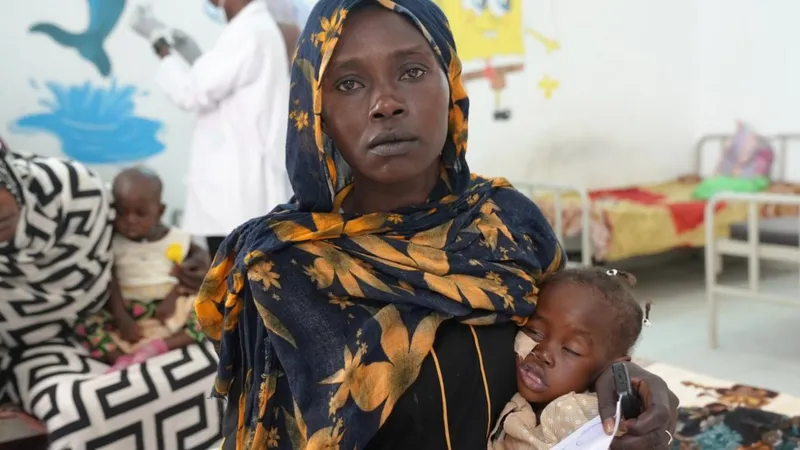Sudan Faces Famine Threat: Stories of Survivors Expose Violence and Assaults
Civilians trapped in Sudan’s civil conflict have provided harrowing testimonies to the BBC, detailing incidents of rape, ethnic violence, and public executions. Journalists from the BBC managed to penetrate the front lines of the conflict near the capital, Khartoum.
United Nations officials have described the situation as one of the worst humanitarian crises in recent memory, with concerns mounting about the potential for a catastrophic hunger crisis on a global scale. Additionally, there are fears that the conflict in Darfur, which saw genocide two decades ago, might be reigniting.
Warning: The following article contains descriptions of physical and sexual violence.
In a sudden explosion in Omdurman, chaos ensues as people scatter, warning of another impending blast. Smoke engulfs the area, transforming the once bustling street into a scene of devastation. Despite recent efforts to reopen shops, the city remains a target, with daily mortar attacks continuing to threaten civilian lives.
Accessing coverage of the civil war has proven challenging for international media, but the BBC team successfully navigated to the front lines, witnessing the desolate transformation of Omdurman. The conflict between Sudan’s military and the Rapid Support Forces (RSF) paramilitary group has resulted in thousands of casualties across the country, with Khartoum and surrounding areas bearing the brunt of the violence.
The RSF’s control extends beyond the capital, reaching into Darfur, where long-standing tensions have escalated into violence between various ethnic communities. Survivors recount horrifying experiences of rape and brutality at the hands of militias, prompting widespread condemnation.
On the front lines in Omdurman, BBC journalists faced strict controls on their movements, highlighting the military’s efforts to suppress information about its activities. Despite recent territorial gains, the sounds of gunfire serve as a constant reminder of the ongoing conflict.
The once vibrant markets of Omdurman now lie in ruins, stripped bare by looting, while military presence dominates the streets. Millions have fled the region in the past year, seeking refuge from the escalating violence, leaving behind a population predominantly composed of the elderly.
Mukhtar al-Badri Mohieddin, among the few remaining residents, mourns the loss of friends and loved ones, surrounded by makeshift graves that dot the landscape. His poignant account reflects the profound toll exacted by the conflict on individuals and communities alike.
The use of rape as a weapon of vengeance has left lasting scars on Sudanese society, with survivors facing stigma and ostracization. Despite the taboo surrounding the topic, emerging testimonies from refugee camps in Chad shed light on the extent of sexual violence perpetrated against women and girls.
In Darfur, the RSF’s expansion has intensified ethnically driven attacks, particularly targeting the Masalit ethnic group. Amina’s traumatic ordeal, echoed by countless others, underscores the brutality inflicted on innocent civilians caught in the crossfire.
Efforts to hold perpetrators accountable have faltered, with both the RSF and Sudanese military deflecting blame for atrocities committed. As the conflict rages on, civilians continue to bear the brunt of the violence, with little hope for a swift resolution.



















